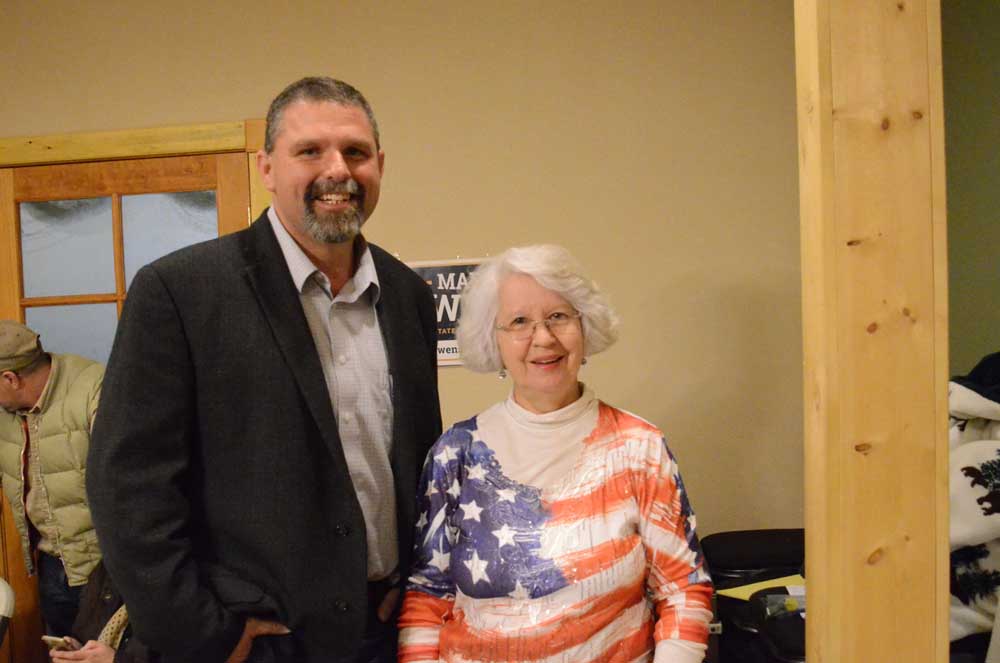Groups seek to spur discussions on Greater Idaho movement
Published 1:15 pm Tuesday, February 9, 2021

- Owens
A measure related to moving Idaho’s border to encompass Eastern Oregon may be on the upcoming ballot.
A group is gathering signatures to put a measure on the ballot that would require Grant County commissioners to hold meetings to discuss the county joining Idaho.
Grant County petitioner Sandie Gilson said she has until Feb. 11 to gather 231 signatures. She said she had 320 Tuesday, but some of the signatures may not be valid county voters.
The petition is about the “Greater Idaho” effort, a movement that advocates for adjusting the current state boundaries of Idaho, California and Oregon, thereby increasing Idaho’s size to encompass several rural counties in California and Oregon. Grant County is one of the 19 Oregon counties the group seeks to have moved into Idaho’s jurisdiction.
In November, 51% of Jefferson County’s residents voted for the measure, and in Union County, 52% of their voters supported it.
Gilson’s view
Gilson, a fifth-generation Oregonian, said she got involved with the with the group in May. She said the state government no longer represents the value system she was raised with while growing up in Paisley, Oregon.
She said she noticed the shift in the 1990s when the northern spotted owl was placed on the endangered species list, beginning in 1990, which resulted in the loss of thousands of logging jobs and effectively changed the face of the timber industry in the northwest.
She said both she and her husband were in the timber industry at the time and switched careers.
“I was pregnant with my third child and on state assistance and went back to school, and I was not rewarded for wanting to work to come out of welfare and that system,” she said. “And so I knew that being a worker, and somebody who works, is no longer appreciated.”
Gilson said a $100 raise resulted in her losing her food stamps, housing assistance and child care.
Gilson said the state pursues “constant taxation, and small-town Oregonians are often mocked by the media.
She said rural Oregon’s representatives in the minority are not heard in Salem.
“What’s the point of voting on anything about Oregon?” she said. “Portland’s going to rule us, and we can’t even get a seat at the table for discussion. … We have no say.”
A political scientist’s view
Boise State University’s Ross Burkhart, a political science professor, said moving the border would be a “steep order.”
He said the state legislatures in Oregon, Idaho and California would have to agree with the border changes, and then the group would have to get the approval of the U.S. Congress.
Burkhart said, if the proposal ever were to make it to Congress, the members would likely take their cues from the California, Oregon and Idaho delegations.
“I would imagine that there would be differences of opinion depending upon the delegation itself, so there’s just a whole lot of moving parts here to imagine that this gets to the reality that all these parts would have to operate in sync,” he said. “And that is a lot to ask.”
Burkhart also pointed out that political winds shift over time. He said voters elected a “fair number” of Democratic legislators to Idaho’s Legislature not too long ago.
“To draw boundaries where you are imagining that the likely perceived ideology of that region is going to remain consistent and especially remain consistent across these new boundaries is a lot to ask,” he said.
He said this leads him to think the motivations are born out of political grievances and frustration with so much political power residing in Salem with the Democrats.
“Trying to solve this problem with a secessionist movement is dicey because things can change politically and have changed politically,” Burkhart said.
State lawmakers’ views
State Rep. Mark Owens, R-Crane, said he does not want to spend time thinking about the process until someone can explain to him whether adjusting the borders can legally be done.
Owens said, however, rural and frontier Oregon is not always well represented in Salem.
“We need to figure out how we can have a stronger voice and how we can make the concerns of our constituents voiced,” he said.
He said he supports any opportunity where rural Oregonians are heard.
State Sen. Lynn Findley, R-Vale, said while moving to a conservative state like Idaho would be great, the likelihood of success is very low.
“A better way to fix it,” he said, “would be to remove the frustration level that our citizenry have on this side of the state and get the state legislature and the state governor to recognize us and support us instead of running over us.”
“What’s the point of voting on anything about Oregon? Portland’s going to rule us, and we can’t even get a seat at the table for discussion. … We have no say.”
—Sandie Gilson, petitioner for Greater Idaho effort
“There’s just a whole lot of moving parts here to imagine that this gets to the reality that all these parts would have to operate in sync. And that is a lot to ask.”
—Ross Burkhart, Boise State University political science professor
“We need to figure out how we can have a stronger voice and how we can make the concerns of our constituents voiced.”
—Rep. Mark Owens, R-Crane
“A better way to fix it would be to remove the frustration level that our citizenry have on this side of the state and get the state legislature and the state governor to recognize us and support us instead of running over us.”
—Sen. Lynn Findley, R-Vale




